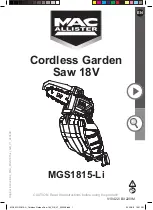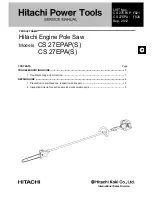
5
4. Release the lower guard.
• If the guard immediately springs back into place, it
is working correctly and you may continue with use.
• If the guard does not immediate spring back
into place, clean the upper and lower guards to
remove all chips and debris. Then, check the
operation again by starting with step 1.
• If the guard still does not immediately spring back
into place, contact a MILWAUKEE service facility
for repairs.
Removing and Installing Chip Container
WARNING
NEVER operate tool when guards
and chip container are not in-
stalled. Serious injury may occur.
To reduce the risk of injury, wear safety goggles
or glasses with side shields when removing the
chip container. Chips and debris may fly up into
the face.
1. Remove battery pack before removing or installing
chip container.
2.
To remove the chip container, open the latch and
pull the chip container off of the tab.
3. To install the chip container, fit the tab pin onto
the tab, position the chip container, and secure
the latch.
Emptying the Chip Container
Chips and other debris from the workpiece are col-
lected inside the chip container, which needs to be
emptied to ensure proper functioning of the tool.
WARNING!
Do not touch the saw blade, workpiece,
chips or chip container with bare hands immediately
after cutting; they may be hot and could burn skin.
1. Remove battery pack.
2. Remove the chip container (see "Removing and
Installing Chip Container") and empty. Use a brush
to ensure all chips and debris have been removed.
3. Remove all chips and debris from upper guard,
blade, and housing.
4. Replace the chip container (see "Removing and
Installing Chip Container").
Installing and Removing Blades
Spindle lock button
To remove, turn
counterclockwise
1. Remove battery pack.
2. Remove the chip container (see"Removing and
Installing Chip Container").
3. Place the saw on a flat surface with the blade fac
-
ing upwards. To remove the bolt from the spindle,
push in the spindle lock button. While holding in the
spindle lock button, use the wrench provided with
the tool to turn the bolt counterclockwise. Remove
the bolt and outer flange.
SPECIFICATIONS
Cat. No. ..................................................... 2982-20
Volts
..............................................................
18 DC
Battery Type
.................................................
M18™
Charger Type
................................................
M18™
Recommended Ambient
Operating Temperature
......................
0°F to 125°F
No Load RPM ..................................................
4000
Blade Size
...........................................................
8"
Arbor
................................................................. 5/8"
Depth of cut
..........................................0 to 2-9/16"
Steel Studs
.....................................
10 gauge, up to
Steel Decking, Roofing Panels ............2-9/16" thick
Steel Plate
...................................................
1" thick
Steel Pipe
....................................................
2" thick
Angle Iron
...............................2-1/2" x 2-1/2" x 1/4"
ASSEMBLY
WARNING
Recharge only with the charger
specified for the battery. For spe
-
cific charging instructions, read the operator’s
manual supplied with your charger and battery.
Removing/Inserting the Battery
To
remove
the battery, push in the release buttons
and pull the battery pack away from the tool.
WARNING
Always remove battery pack before
changing or removing accessories.
To
insert
the battery, slide the pack into the body
of the tool. Make sure it latches securely into place.
WARNING
Only use accessories specifically
recommended for this tool. Others
may be hazardous.
Selecting Blade
Select a blade appropriate for your application. Refer
to the “Accessories” section for a list of blades to be
used for the proper applications of this tool.
Always use sharp blades. Dull blades tend to over
-
load the tool and increase the chance of KICKBACK.
Only use thin kerf blades with a maximum safe oper-
ating speed greater than the no load RPM marked on
the tool's nameplate. Read the blade manufacturer's
instructions before use. Do not use any type of abra
-
sive cut-off wheel or dry diamond cutting blades. Use
the correct blade type for your application. Using the
wrong blade may result in reduced performance or
damage to the blade. Do not use blades that are
cracked or have broken teeth. Do not sharpen ferrous
metal cutting blades; see the blade manufacturer's
recommendations regarding sharpening.
Checking the Operation of the Lower Guard
Check the operation and condition of the lower guard
lever. If the guard and the lever are not operating
properly, they must be serviced before use. Lower
guard may operate sluggishly due to damaged parts,
gummy deposits, or a buildup of debris.
1. Remove battery pack.
2. Place the tool on its side.
NOTE:
This procedure will not show proper lower
guard operation if the tool is not on its side.
3.
Grasp the lower guard by the sides and push it all
the way back into the blade housing.






































